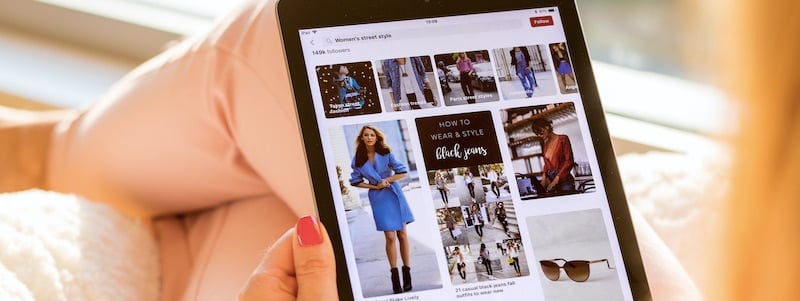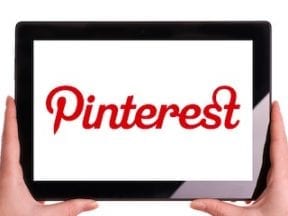
Pinterest has roughly 250 million monthly users. The platform is often overlooked by fashion and lifestyle marketers, which could be costly.
Fashion and lifestyle businesses typically favor Instagram and Facebook for marketing. Most neglect Pinterest. That’s a mistake. Pinterest is a critical, untapped source of quality traffic.
I recently included Pinterest in a social media marketing package for a fashion client. Pinterest produced strong results. The client’s Pinterest account barely existed before we started — roughly three hundred views per month. It grew to 37,000 monthly views, which translated into traffic and conversions, all within our small budget.
According to Statista:
- 250 million people used Pinterest in September 2018.
- 58.9 percent of U.S. Pinterest users are women.
- 29 percent of mobile Pinterest users log in several times a week; 24 percent do it daily; 12 percent several times per day.
4 Reasons
In my experience, there are four compelling reasons for most business — especially fashion and lifestyle — to use Pinterest.
- Pinterest is a search engine. Knowledgeable businesses can get far ahead of the competition by optimizing content for search rankings on Pinterest. If you are familiar with search engine optimization for Google, you will succeed on Pinterest.
- Pinterest is highly visual. Merchants can showcase their products with photos and videos.
- Pinterest is more static than Instagram and Facebook. Older Instagram and Facebook posts go below new content. If users want to see your old posts, they have to scroll down. Pinterest boards, however, stay in the same location. Pins are located within a board. They don’t get pushed down like Instagram and Facebook posts. If your boards have too many pins, you can subdivide them or start a new board.
- Pinterest is underutilized by businesses, especially wholesale. There is likely less competition on Pinterest than on Instagram.
Getting Started
Treat Pinterest as any other acquisition channel. Develop a strategy, tactics, and schedules. Develop new content and then reuse it later. Boards should mirror your website — categories, subcategories, about us, testimonials, FAQs.
Pin each of your products to different boards if possible. For example, pin a “red cocktail dress” to the “Cocktail Dresses” and “Valentine’s Day” boards.
Base each description on the words that searchers use. Before starting on Pinterest, research keywords and then logically include them in your copy. Each image file should have a keyword in its name.
Creating Boards
Fine-tune your boards and their content after researching keywords. In my experience, the following boards are essential.
About us. Pins can vary from your company story to employees’ pictures. However, the most important is to pin images of benefits. In other words, emphasize how your company helps customers. Explain why shoppers choose your business and why your products are better than others.
FAQs. Create visual pins for all potential questions from prospects.
Testimonials. Reviews and testimonials with photos and videos add credibility and trust.
Product boards. Include as many products as you want, but do not crowd your account. Your website is clean and easy to navigate. Your Pinterest account should be, too. If you have too many product categories on your website, create category boards with subcategories in them. If your product assortment is narrow, create separate boards for each category. Account optimization is the most critical aspect, not the number of boards.
Resources. Turn your how-to blog posts or videos into traffic-generating pins.
Quotes. Pins with quotes tend to generate traffic. Make sure that quotes are relevant to what you do. If you can’t find suitable quotes, write them.
Behind the scenes. Shoppers relate to people. Showcase what goes on within your business, such as product design, photo shoots, tradeshow activities, and in-house events.
Niche-specific. Include other content that interests your target audience. If you sell cooking equipment, create a recipe board. If you carry a skin care line, pin beauty routines.
Optimizing
Optimizing your content for searchers on Pinterest is the key to success on the platform. Here are the main steps.
- Conduct extensive keyword research using quality tools such as SEMrush as well as the Pinterest engine itself.
- Use longer tail keywords versus general terms.
- Front load keywords in the names of boards, pins, and in image descriptions.
- Make all descriptions keyword based. Use keywords and related phrases and synonyms.
- Apply Google SEO techniques to your Pinterest texts and images.
- Link all pins (not repins) to your website. Link products to product pages. Link gated content to the home page or category pages.
- Keep boards related to your company on the top of your Pinterest account and boards with re-pinned items below.
Detailed strategies to encourage consumer engagement on Pinterest are beyond the scope of this article. Focus initially on using the right keywords and hashtags. Then other interested pinners will find and follow you.




